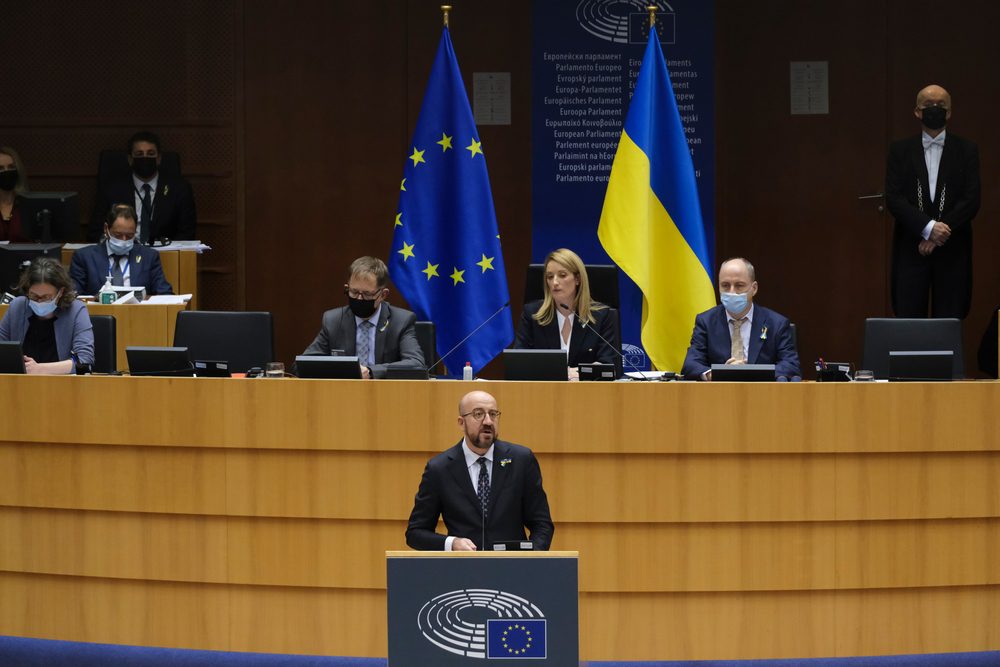
Without any real surprise, the European summit in Brussels decided on Thursday, June 23rd, in favour of Ukraine’s and Moldova’s applications to join the European Union, following the Commission’s recommendations communicated on Friday, June 17th. Georgia’s application, meanwhile, has been postponed and is subject to further reforms.
The member countries therefore voted unanimously to grant official candidate status to Ukraine.
Agreement. #EUCO has just decided EU candidate status to Ukraine and Moldova.
— Charles Michel (@CharlesMichel) June 23, 2022
A historic moment.
Today marks a crucial step on your path towards the EU.
Congratulations @ZelenskyyUa and @sandumaiamd and the people of Ukraine 🇺🇦 and 🇲🇩
Our future is together.
Following the vote, a press conference was held between Charles Michel, President of the European Council, Ursula von der Leyen, President of the European Commission, and French President Emmanuel Macron, as France currently holds the rotating presidency of the EU. “This is an historic moment,” said Michel, while von der Leyen added, “It is a very good day for Europe today.” Emmanuel Macron hailed the “giant steps” taken in the last few days by the European partners.
The news comes at the right time to boost the morale of Ukrainians, who are suffering serious military setbacks courtesy of the Russian forces. Immediately after the vote was announced, Ukrainian President Volodymyr Zelensky addressed the European Council in a video message and personally thanked each of the European leaders. Some of them, such as Olaf Scholz, had been the target of sharp criticism from the Ukrainian president in March for their degree of support for the attacked country, which was considered too weak. This time, however, Zelensky was unsparing in his praise: “Germany stands for us. Thank you, Olaf! Thank you for your support at a crucial moment.” Zelensky’s thanks also went to Hungarian Prime Minister Viktor Orbán, whom Ukraine had not refrained from criticising in recent months either: “Thank you, Mr. Prime Minister, thank you, Viktor, together we are capable of much more than alone!”
The general enthusiasm that greeted this decision contrasts with the tone of the exchanges that took place on the morning of June 23rd, when the countries of the Western Balkans reacted to the way in which their accession process to the European Union is still being held up. Albanian Prime Minister Edi Rama deployed very strong words to condemn the EU’s attitude and its biased approach to admitting new members, not hesitating to speak of its “totally crooked spirit of enlargement.” The Prime Minister of Northern Macedonia also made his violent disapproval unambiguously known: “What is happening now is a serious problem and a serious blow to the credibility of the European Union,” he explained. In order to ease tensions, Charles Michel decided to interpose a discussion on the problems faced by the Western Balkans, and in particular Bosnia-Herzegovina, before the resumption of the debate on Ukraine. This was intended to send a signal that the European Union was genuinely listening to the difficulties of this part of the European continent.
The decision taken in Brussels on Thursday, June 23rd, is above all a symbolic one, in the form of a response to Vladimir Putin who declared only a few weeks ago that the Ukrainian state had never truly existed and had no international legitimacy. The accession process is open, but will certainly take many years, as Ukraine still has a lot of work to do in order to meet the exacting European criteria required for entry. President Zelensky announced that his country would start work immediately.
Ukraine’s accession to candidate status does not mean that Emmanuel Macron has given up on his idea of an intermediary community for countries-in-waiting. President Macron insisted on the need to make the enlargement process “credible” in the eyes of the candidate states. His plan for a European political community remains relevant to forge stronger strategic links with neighbouring countries during the long period of the accession process, in order to avoid what he called “enlargement fatigue.” The French plan has given rise to discussions in Brussels, with varying degrees of enthusiasm among member states.
